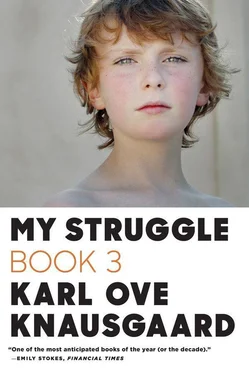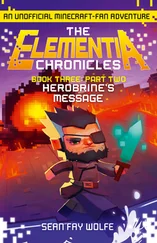Oh, that was dreadful.
But I kept the comics in my room; Mom had never so much as cast a glance at them.
Now, out of the blue, I wasn’t allowed to read them.
How unfair was that?
I cried, I was incensed, I went to see her again and said she had no right to ban them, knowing that the battle was lost, she had made up her mind, and if I didn’t stop protesting she would just tell Dad, after which further resistance would be hopeless.
The comics I had borrowed were returned; the others were thrown away. The next day we went to the library, we were each given a membership card, and then it was done, from this moment on books held sway. Every Wednesday I came down the steps outside Arendal Library with a carrier bag full of books in each hand. I went with Mom and Yngve, who had likewise borrowed vast quantities, then it was back to the car, go home, lie down on my bed, read almost every evening, all Saturday and all Sunday, a pattern broken only by shorter or longer excursions outside, all depending on what was going on, and when the week was up it was back to the library with the two bags of finished books and two new bags. I read all the series they had, I liked Pocomoto best, the little boy who grew up in the Wild West, but also Jan, and the Hardy Boys, of course, and the Bobbsey Twins and Nancy Drew, the Girl Detective. I liked the Famous Five series and I plowed through a series of books about real people, reading about Henry Ford and Thomas Alva Edison, Benjamin Franklin and Franklin D. Roosevelt, Winston Churchill, John F. Kennedy, David Livingstone, and Louis Armstrong, always with tears in my eyes over the last pages, because, naturally enough, they all died. I finished the Vi Var Med series, about all the known and unknown expeditions of discovery in the world, I read books about sailing ships and space travel, Yngve got me into books by von Däniken, who thought that all the great civilizations had come about as a result of encounters with extraterrestrial creatures, and books about the Apollo program, starting with the astronauts’ fighter-plane pasts and their attempts to set speed records. I also read all Dad’s old Gyldendal books for boys, of which the one that made the greatest impression was probably Over Kjølen i Kano, where a father goes on a camping trip with two boys and sees a great auk everyone thought was extinct. I also read a book about a boy who was picked up by a zeppelin in England during the years between the wars, I read Jules Verne’s many books, my favorites being Twenty Thousand Leagues under the Sea and Around the World in Eighty Days, also one called The Lottery Ticket about a poor family in Telemark who won a fortune in a lottery. I read The Count of Monte Cristo and The Three Musketeers, Twenty Years After and The Black Tulip. I read Little Lord Fauntleroy, I read Oliver Twist and David Copperfield, I read Nobody’s Boy and Treasure Island and The Children of the New Forest, which I loved and read again and again as I had been given it and didn’t borrow it. I read Mutiny on the Bounty, Jack London’s books, and books about the sons of Bedouins and turtle hunters, stowaways and race car drivers, I read a series about a Swede who was a drummer boy in the American Civil War, I read books about boys who played soccer and I followed them season after season, and I read the more social-issue-style books that Yngve brought home, about girls who got pregnant and were going to have a baby, or who ended up on Skid Row and started taking drugs, it made no difference to me, I read everything, absolutely everything. At the annual flea market in Hove I found a whole series of the Rocambole books, which I bought and devoured. A series about a girl called Ida was another I read even though there must have been all of fourteen titles. I read all Dad’s old copies of Detektivmagasinet, and bought books about Knut Gribb, the Oslo detective, when I had enough money. I read about Christopher Columbus and Magellan, about Vasco da Gama and about Amundsen and Nansen. I read A Thousand and One Nights and Norwegian folk tales, which Yngve and I were given one Christmas by Grandma and Grandad. I read about King Arthur and the Knights of the Round Table. I read about Robin Hood, Little John, and Maid Marian, I read about Peter Pan and about poor boys who swapped their lives for those of rich men’s sons. I read about boys who participated in sabotage operations during the German occupation of Denmark, and about boys who rescued someone from an avalanche. I read about a strange little man who lived on a beach and survived on what he could salvage from shipwrecks, and about young English boys who were cadets on naval vessels and Marco Polo’s adventures at the court of Genghis Khan. Book after book, bag after bag, week after week, month after month. From everything I read I learned that you had to have courage, that courage was perhaps the supreme attribute, that you have to be honest and sincere in all your dealings and that you must never let others down. In addition, that you must never give in, never give up, because if you have been resolute, upright, brave, and honest, however lonely it has made you and however alone you stand, in the end you are rewarded. I thought a lot about that, it was one of the thoughts I embraced when I was alone, that one day I would be back here and be someone. That I would be someone big whom everyone in Tybakken would be forced, whether they liked it or not, to admire. It wouldn’t come any day soon, I knew that, for it wasn’t respect I won when Asgeir made a derogatory comment about me and a girl I liked — I went for him and he simply forced me to the ground, straddled me, and started prodding my chest and cheeks, laughing and jeering. I happened to have a yellow Fox in my mouth and I tried to spit it out at him, to no avail, which was underhanded, everyone knew that, but the sticky yellow mess went all over my face. You smell of piss, you shit, I said to him, and it was true, he did. And, if that wasn’t enough, he had two sets of teeth, just like a shark, one row inside the other, and I pointed this repugnant sight out to the crowd milling around, not that it helped, I was on my back, vanquished, utterly powerless. You couldn’t get further from the ideals I had acquired through reading — which in fact were also valid among children, there were many of the same concepts of honor, although that precise word was not used, but that was what it was about. I was weak, slow, cowardly; not strong, quick, courageous. What good was it that, unlike them, I had been in contact with the ideals, that I knew them inside out, better than any of them ever would, when I couldn’t live up to them? When I cried for no reason? It felt unjust that I, of all people, who knew so much about heroic bravery, should be saddled with such frailties. But then there were books about frailties as well, and one of them carried me on a wave that would last several months.
One autumn I fell ill, during the day I lay in bed and was bored and one morning before going to work Dad brought me some books. He’d had them in the cellar, they were from his childhood in the fifties and I was free to borrow them. A handful had been published by a Christian company and for some reason they were the ones that made the strongest impression on me, one of them indelibly. It was about a boy whose father had died and who stayed at home to look after his sick mother; they lived in poverty and were completely dependent on the boy’s efforts to make ends meet. He was confronted by a group, or a gang more like, of boys. Not only did they hound and beat up this boy who was so different from them, they swore and stole as well and the inequity of this gang’s successes, in the light of the constant setbacks suffered by the honest, loving, and upright protagonist, was almost impossible to bear. I cried at the unfairness of it, I cried at the evil of it, and the dynamics of a situation whereby good was suppressed and the pressures of injustice were approaching bursting point shook me to the core of my soul and made me decide to become a good person. From then on I would perform good deeds, help where I could, and never do anything wrong. I began to call myself a Christian. I was nine years old, there was no one else in my close vicinity who called himself a Christian, neither Mom nor Dad nor the parents of any of the other kids — apart from Øyvind Sundt’s parents, who warned him off Coke and candy and watching TV and going to the cinema — and of course no young people, so it was a fairly solitary undertaking I initiated in Tybakken at the end of the seventies. I began to pray to God last thing at night and first thing in the morning. When, in the autumn, the others gathered to go apple scrumping down in Gamle Tybakken I told them not to go, I told them stealing was wrong. I never said this to all of them at once, I didn’t dare, I was well aware of the difference between group reactions, when everyone incited each other to do something or other, and individual reactions, when each person was forced to confront an issue head-on with no hiding place in a deindividuated crowd, so that was what I did, I went to those I knew best, my peers, and said to each one that apple scrumping was wrong, think about it, you don’t have to do it. But I didn’t want to be alone, so I accompanied them, stopped by the gate, and watched them sneak across the age-old fields in the dusk, walked beside them as they scoffed apples on the way back, their winter jackets bulging with fruit, and if anyone offered me anything I always refused, because dealing was no better than stealing.
Читать дальше












